This article was co-authored by Tracy Carver, PhD. Dr. Tracy Carver is an award-winning Licensed Psychologist based in Austin, Texas. Dr. Carver specializes in counseling for issues related to self-esteem, anxiety, depression, and psychedelic integration. She holds a BS in Psychology from Virginia Commonwealth University, an MA in Educational Psychology, and a Ph.D. in Counseling Psychology from The University of Texas at Austin. Dr. Carver also completed an internship in Clinical Psychology through Harvard University Medical School. She was voted one of the Best Mental Health Professionals in Austin for four years in a row by Austin Fit Magazine. Dr. Carver has been featured in Austin Monthly, Austin Woman Magazine, Life in Travis Heights, and KVUE (the Austin affiliate for ABC News).
There are 18 references cited in this article, which can be found at the bottom of the page.
wikiHow marks an article as reader-approved once it receives enough positive feedback. In this case, several readers have written to tell us that this article was helpful to them, earning it our reader-approved status.
This article has been viewed 170,962 times.
Everyone worries sometimes. However, if you find your mind is on overdrive all the time, you may need to find ways to calm it down or clear it. Meditation, yoga, and mindfulness can help you clear you mind, which can calm your thoughts down. However, you can also learn ways to distance yourself from your anxiety, so that it doesn't run your life. You may also find that your mind employs cognitive distortions, which are ways your mind plays tricks on you to convince of something that isn't objectively true; figuring out which ones your mind uses is the first step to combating them.
Steps
Taking Practical Steps
-
1Write pressing thoughts down. If you find your mind racing before a bed or while you're trying to work on something else, take a moment to organize your thoughts. Write down the things you need to get down on a to-do list. Put any ideas down in a notebook or computer file for that purpose. Jot any questions or thoughts down on a notepad. Once you've taken a few minutes to organize your thoughts on paper or a screen, your mind will be freer to work on other tasks.[1]
-
2Use a journal. Another helpful writing technique is to make writing in a journal a part of your nightly routine. Taking time to write about your thoughts and feelings can have a similar effect to telling someone about them; that is, it helps draw out some of the tension and anxiety. Don't think you have to write about anything specific--just start writing, and see what comes out.[2]Advertisement
-
3Focus on one task at a time. It's tempting in today's busy world to try to do more than one thing at a time. However, your brain isn't built to work like that; rather, it's built to focus on one task at a time. If you try to focus on more than one task, your work becomes sloppier and you'll feel mentally disheveled.[3]
-
4Learn to sort information. When you have too much information coming in, it can feel overwhelming. Try to develop a system to sort through information as it comes in, only keeping the important stuff. The extraneous details just bog down your mind. One way to know what's important is to listen to what's being repeated, as usually only the important stuff gets that treatment.[4]
Using Meditation to Calm Your Mind
-
1Try using a mantra. A mantra is just a simple phrase or word that you repeat over and over. You use it to clear your mind in meditation. For instance, one of the traditional phrases is "om," usually drawn out ("ommmmm"). However, you can use any phrase you want from "I love life" to "No more fear."
- To try it out, take a moment to close your eyes, and breathe deeply. Repeat your phrase over and over, focusing your thoughts only on your mantra. If your mind wanders, focus back on your mantra.
-
2Focus on your breathing. One way to meditate is to simply focus on your breathing. Sit quietly with your eyes closed. Pay attention only to your breathing as you try to slow it down. If it helps, try counting to eight as you breathe in and to eight as you breathe out. Your mind will wander off, but just bring it back to your breathing.[5]
-
3Meditate anywhere. Another way to meditate, which you can do almost anywhere, is to focus your attention on what your body is feeling. Sit or stand with your feet about shoulder-width apart. Focus your attention on what your muscles are feeling. By focusing on what your body is feeling, you're pulling yourself out of your mind and calming down.[6]
- For instance, on a subway, you might feel the movement under your feet. Sitting a park, you might just feel the weight of your body on the bench, the breeze on your face, the solidness of the ground under your feet.[7]
- Meditation can seem tough at first, but as you develop a regular meditation practice, it becomes a lot easier. It's a really useful (and free) way to help clear your mind so you can feel calm and centered.[8]
-
4Use walking meditation. Walking meditation is similar to breathing meditation; that is you focus on your breathing to pull yourself out of your head. However, you also focus on the steps you are taking as well.
- Slow down your pace. When you're using walking meditation, you need to be aware of each step, and you can only do that if you slow down your walking.
- The great thing about walking meditation is that you can do it almost anytime, even going around the grocery store.
Trying Out Yoga
-
1Start with child pose. This pose is meant to be centering, helping you to focus on your breathing. For this basic pose, kneel on the ground. Place your forehead on the floor with your hands flat on the floor. Try to lean into the pose, and focus on your breathing. Hold this pose for about 5 minutes.[9]
-
2Try caterpillar pose. Sit on the floor. Have your legs straight out in front of you. Lean forward, stretching towards your feet. If it hurts, try bending your knees a bit. Stay in the position for about 5 minutes.[10]
-
3Use a one-legged position. These types of position take much of your attention, as you're trying to balance. Therefore, they help clear your mind.
- One such position is called tree. Start with both legs on the ground. Push to balance on one leg. Bring up the other leg to about knee-level, letting your heel point upward. The bottom of your foot should be resting on the inside of your other leg. Make sure you are balanced, then either bring your hands together (flat-palmed) at chest level or raise your arms out to the sky. Count each breath, holding the pose until you reach 10; then move to the other leg.
-
4End with savasana. This pose is very simple; you just lay down flat on the floor, face up. Focus on relaxing your muscles and breathing in and out.
Practicing Mindfulness
-
1Try mindfulness exercises. Mindfulness is a lot like taking meditation into everyday life. Except, instead of focusing on your breathing, you're focusing on everything that happens to you without passing judgment. So, for instance, instead of letting your mind wander away while you're drinking a cup of coffee, you focus on each sip, savoring the flavor and warmth.[11]
-
2Try a self-compassion break. Bring a stressful situation in your current life to mind. Acknowledge that it is painful. You could say something like "This situation is causing me suffering," or "I find this painful."[12]
- Don't beat yourself up when your thoughts are racing. That's exactly what your brain is supposed to do, so remember to be kind to yourself.[13]
- Place your hands on your chest, and feel their weight there. Acknowledge that you need to be kind to yourself and not beat yourself up. You could say, "I should be kind to myself," or "May I be compassionate to myself."
-
3Treat yourself as a friend. If you think about, you may be easier on your friends than you are on yourself. Often, you're your own worst critic. However, you can use a mindfulness exercise to help change how you treat yourself.[14]
- Get out something to write on. Bring to mind a time when a friend was struggling or felt bad about herself. Write down how you responded or tried to help.[15]
- Now bring to mind a similar situation you faced. Write down how you responded to yourself.[16]
- Notice if the responses are different. Question why they are different, and what anxieties lead to them being different. Employ that knowledge the next time you're feeling bad by responding to yourself as you would your friend.[17]
-
4Practice mindfulness in daily activities. With each activity you do in a day, you have the opportunity to be mindful. That is, you have the opportunity to be truly present, to pay attention to what you're doing and feeling.[18]
- For instance, while you're showering, you can pay attention to rubbing the shampoo in your hair, the sensation of your fingers on your scalp. You can feel the soap as you rub it into your body.
- While eating, you can make sure you are tasting each bite, savoring the flavors.
- Every time your mind wanders, bring it back to what you're doing.[19]
Using Other Ways to Calm Your Mind
-
1Think through your anxiety. Instead of letting anxiety throw you for a loop, let it guide you. Ask yourself three questions when you find yourself anxious: First, ask yourself what you can learn from your anxiety. Next, ask yourself what your mind is trying to say to you through its anxiety. Finally, ask what you can do to resolve the situation.
- For instance, say you're worrying about a job interview. This kind of anxiety can teach you that you find social situations nerve-wracking, and you may want to give yourself more time to prepare in the future. It could also be that your mind is trying to tell you you're not as prepared as you need to be, and you need to spend more time researching.
-
2Use cognitive distancing. Your mind is basically working itself up over nothing. That is, it's predicting that bad things will happen. However, you can balance out your mind's tendency to come up with negative scenarios by coming up with positive ones instead.[20]
- For instance, consider the likeliness of negative scenario actually happening. Yes, you could be mugged because you're out after dark, but incidents are relatively rare.
- Think about positive outcomes instead or at least non-negative ones. If you had an interview and you're worried you did badly, think about what could happen. Maybe you didn't do as badly as you think, and you'll get a call back. However, even if you did do badly and you don't get the job, you learned from the experience and can do better on the next one.
- Analyze what's most likely to happen. Most of the time, the worst-case scenario your brain came up with is not likely to happen.
-
3Tell yourself what you think isn't the whole truth. Your brain puts together facts and ideas and mixes them with your experiences and thoughts. What goes on your brain isn't the objective truth that everyone else sees. Therefore, when you're having negative thoughts, step back from them a second see if what you perceive as a threat is really as bad as it seems; sometimes, your mind is just reacting instinctively.[21]
- For instance, say you're looking around the room, and someone looks away as soon as you look at her. You may perceive this action as an affront. However, it could be just as likely that she was turning her head just as you came to her, and she didn't see you at all.
-
4Learn to label your thoughts. One way to realize how negatively your thinking is to start labeling your thoughts. For instance, the next time you say "My hair looks awful," label that as "judgmental." Alternatively, the next time you say, "I hope my kid doesn't have a bicycle accident," label that as a "worry." Once you begin to see how much you worry or judge, you may realize you want to change those thoughts into something else.[22]
- For instance, if you catch yourself saying, "I hope my kid doesn't have a bicycle accident," you can tell yourself that you've done everything you can to make her safe on her bicycle (by providing safety gear and giving her a safe place to ride), and now you have to stop worrying and enjoy spending time with your kid.
-
5Stop your own criticisms. Often, you will be your own worst enemy. You may be criticizing yourself when no one is. If you can stop that criticism and turn it around, you can help slow down your overactive mind.[23]
- For instance, if you find yourself thinking something negative about your body, try to turn it into something positive. You could say, "I don't like the way my legs look. But they are strong, and they've carried me through many trials."
-
6Use bathing or showering to calm your mind. Sometimes, just hopping in the shower in and of itself will help calm your mind. However, it also helps to add a cleansing ritual to it. For instance, as you shower, think about everything you are worried about being sucked down the drain, meaning you don't have to hold on to those worries anymore.[24]
-
7Learn to be grateful. Sometimes, the only way to refocus an overactive mind is to turn it to what's good rather than focusing on what's bad. For instance, take some time each day to write down a couple of things you're grateful for. Alternatively, if you find your mind going off the rails, take a few minutes to think about the people and things in your life that you love and are grateful for.[25]
Recognizing Cognitive Distortions
-
1Watch for jumping to conclusions. Sometimes, your brain will jump to what it thinks is a logical conclusion, often a bad one. However, much of the time, that conclusion isn't correct. This type of thinking can lead to your brain working overtime, so learning how to notice it and change that thinking can help calm your mind.[26]
- For instance, you may notice that you automatically think someone is snubbing you because she didn't invite you to lunch. Your mind jumped to that conclusion. However, it may be that she just didn't realize you were in your office.[27]
- When you make a snap judgment, ask yourself if there could be another explanation.
-
2Pay attention to your mental filter. Your brain may latch on to the one negative part of an interaction or situation. In reality, it may be just a small part of the interaction that no one else pays attention to, but you hyper-focus on it, coloring everything negative. If you do this type of thinking all the time, your brain will be overactive, so trying to turn this filter off can help calm your mind.
- For instance, maybe you've made a meal for your family. Everyone seems to love it, except one of your kids, who makes a snide remark. Instead of focusing on the fact that everyone else loves it, you hyper-focus on the negative remark, wondering what you could have done better.
- Instead of looking for negativity, try to focus on the positive, especially if it far outweighs the negativity.
-
3Look out for overgeneralization. You may also find yourself overgeneralizing from one incident. In other words, you had something bad happen once in a certain situation, so you decide to never put yourself or someone else in that situation again. If you overgeneralize everything, you're constantly thinking about what bad thing is going to happen next; to calm your mind, you need to learn to turn off this kind of thinking.[28]
- For instance, say your kid cuts himself on a knife while helping you in the kitchen. You may decide that the best thing is to never let him help again to keep him safe, when really, he likely will learn from the experience and be more careful in the future. Maybe a more logical response would be to go over knife safety with him again.[29]
- In other words, don't let one bad incident make up your mind, especially if you've had positive experiences in the past.
-
4Watch for all-or-nothing thinking. This type of thinking can cause you to see everything as failure. It goes hand-in-hand with a perfectionist mentality; if you can't do something perfectly, than it's a failure. This type of thinking can make your mind overactive because you're always looking for your next mistake, so learning not to think this way can calm your mind down.
- For instance, say you have promised yourself that you are going to exercise everyday, and then you miss a day. If you're an all-or-nothing thinker, you may decide your exercise program is ruined and give up.
- Be forgiving of yourself. Not every situation is going to be perfect, and you're going to make mistakes. Give yourself permission to start over again with a clean slate.
-
5Make sure you're not catastrophizing. Basically, this type of cognitive distortion is always thinking the worst will happen. You might find yourself maximizing insignificant mistakes to justify the thought that the worst is coming. On the other hand, you might find yourself minimizing something to justify the same conclusion. Similar to other types of cognitive distortions, you'll find that this type of thinking has your brain going 24/7 thinking the worse, so turning this type of thinking off will help you calm down your mind.[30]
- For instance, you might decide that because you forgot to send your kid's lunch to school, he's going to go hungry, and then he might eat someone else's lunch that has a peanut butter sandwich in it (which he's allergic to). You worry he might have an allergic reaction and die.[31]
- Alternatively, maybe you decide that your friend (who has an impeccable driving record) isn't a good driver because she accidentally made a U-turn where she wasn't supposed to, and you use that to justify not riding with her because you don't want to get in a car crash.[32]
- Look at each of the situations realistically. For instance, your kid is likely to remember he's allergic to peanuts, and even if he does accidentally eat some, a nurse is on hand at school to help deal with the situation. Alternatively, don't let your friend's one mistake ruin her whole record; everyone makes mistakes, and she's obviously a pretty good driver if she has a good record.
-
6Understand these aren't the only cognitive distortions. Your mind is always willing to play tricks on you. Therefore, you should always take the time to step back from the situation and see if what you're thinking is really objective or true when your mind is on overdrive.
Expert Q&A
Did you know you can get expert answers for this article?
Unlock expert answers by supporting wikiHow
-
QuestionWhy is my mind constantly racing?
 Tracy Carver, PhDDr. Tracy Carver is an award-winning Licensed Psychologist based in Austin, Texas. Dr. Carver specializes in counseling for issues related to self-esteem, anxiety, depression, and psychedelic integration. She holds a BS in Psychology from Virginia Commonwealth University, an MA in Educational Psychology, and a Ph.D. in Counseling Psychology from The University of Texas at Austin. Dr. Carver also completed an internship in Clinical Psychology through Harvard University Medical School. She was voted one of the Best Mental Health Professionals in Austin for four years in a row by Austin Fit Magazine. Dr. Carver has been featured in Austin Monthly, Austin Woman Magazine, Life in Travis Heights, and KVUE (the Austin affiliate for ABC News).
Tracy Carver, PhDDr. Tracy Carver is an award-winning Licensed Psychologist based in Austin, Texas. Dr. Carver specializes in counseling for issues related to self-esteem, anxiety, depression, and psychedelic integration. She holds a BS in Psychology from Virginia Commonwealth University, an MA in Educational Psychology, and a Ph.D. in Counseling Psychology from The University of Texas at Austin. Dr. Carver also completed an internship in Clinical Psychology through Harvard University Medical School. She was voted one of the Best Mental Health Professionals in Austin for four years in a row by Austin Fit Magazine. Dr. Carver has been featured in Austin Monthly, Austin Woman Magazine, Life in Travis Heights, and KVUE (the Austin affiliate for ABC News).
Licensed Psychologist
-
QuestionHow do I stop overthinking?
 Tracy Carver, PhDDr. Tracy Carver is an award-winning Licensed Psychologist based in Austin, Texas. Dr. Carver specializes in counseling for issues related to self-esteem, anxiety, depression, and psychedelic integration. She holds a BS in Psychology from Virginia Commonwealth University, an MA in Educational Psychology, and a Ph.D. in Counseling Psychology from The University of Texas at Austin. Dr. Carver also completed an internship in Clinical Psychology through Harvard University Medical School. She was voted one of the Best Mental Health Professionals in Austin for four years in a row by Austin Fit Magazine. Dr. Carver has been featured in Austin Monthly, Austin Woman Magazine, Life in Travis Heights, and KVUE (the Austin affiliate for ABC News).
Tracy Carver, PhDDr. Tracy Carver is an award-winning Licensed Psychologist based in Austin, Texas. Dr. Carver specializes in counseling for issues related to self-esteem, anxiety, depression, and psychedelic integration. She holds a BS in Psychology from Virginia Commonwealth University, an MA in Educational Psychology, and a Ph.D. in Counseling Psychology from The University of Texas at Austin. Dr. Carver also completed an internship in Clinical Psychology through Harvard University Medical School. She was voted one of the Best Mental Health Professionals in Austin for four years in a row by Austin Fit Magazine. Dr. Carver has been featured in Austin Monthly, Austin Woman Magazine, Life in Travis Heights, and KVUE (the Austin affiliate for ABC News).
Licensed Psychologist I find meditation to be the number one way to combat an overactive mind. It's really useful to clear out that mental debris so you can feel calm and centered. However, meditation can seem overwhelming or scary to some people, so it can help to have the support of a qualified mental health professional to help you start your meditation practice.
I find meditation to be the number one way to combat an overactive mind. It's really useful to clear out that mental debris so you can feel calm and centered. However, meditation can seem overwhelming or scary to some people, so it can help to have the support of a qualified mental health professional to help you start your meditation practice.
References
- ↑ http://www.lifehack.org/articles/productivity/how-to-organize-your-brain-for-better-productivity.html
- ↑ http://www.lifehack.org/articles/lifestyle/11-ways-make-your-mind-calm-and-peaceful.html
- ↑ http://www.inc.com/larry-kim/why-multi-tasking-is-killing-your-brain.html
- ↑ https://www.psychologytoday.com/blog/the-power-forgetting/201402/four-secrets-organizing-info-quickly-in-your-brain
- ↑ http://www.meditationoasis.com/how-to-meditate/simple-meditations/breathing-meditations/
- ↑ https://www.psychologytoday.com/blog/urban-mindfulness/200902/subway-meditation-no-cushion-required
- ↑ https://www.psychologytoday.com/blog/urban-mindfulness/200902/subway-meditation-no-cushion-required
- ↑ Tracy Carver, PhD. Licensed Psychologist. Expert Interview. 7 January 2021.
- ↑ http://www.stuff.co.nz/life-style/well-good/teach-me/70972187/Six-yoga-poses-to-help-you-sleep-better
- ↑ http://www.stuff.co.nz/life-style/well-good/teach-me/70972187/Six-yoga-poses-to-help-you-sleep-better
- ↑ http://www.wildmind.org/applied/daily-life/what-is-mindfulness
- ↑ http://ggia.berkeley.edu/practice/self_compassion_break#data-tab-how
- ↑ Tracy Carver, PhD. Licensed Psychologist. Expert Interview. 7 January 2021.
- ↑ http://ggia.berkeley.edu/practice/how_would_you_treat_a_friend#data-tab-how
- ↑ http://ggia.berkeley.edu/practice/how_would_you_treat_a_friend#data-tab-how
- ↑ http://ggia.berkeley.edu/practice/how_would_you_treat_a_friend#data-tab-how
- ↑ http://ggia.berkeley.edu/practice/how_would_you_treat_a_friend#data-tab-how
- ↑ http://www.wildmind.org/applied/daily-life/daily-activities
- ↑ http://www.wildmind.org/applied/daily-life/daily-activities
- ↑ https://www.psychologytoday.com/blog/the-mindful-self-express/201506/9-ways-calm-your-anxious-mind
- ↑ https://www.psychologytoday.com/blog/the-mindful-self-express/201506/9-ways-calm-your-anxious-mind
- ↑ https://www.psychologytoday.com/blog/the-mindful-self-express/201506/9-ways-calm-your-anxious-mind
- ↑ http://www.lifehack.org/articles/lifestyle/11-ways-make-your-mind-calm-and-peaceful.html
- ↑ http://yogachicago.com/2014/02/spiritual-housekeeping-tips-to-clear-your-mind-and-clear-your-home/
- ↑ http://www.lifehack.org/articles/lifestyle/11-ways-make-your-mind-calm-and-peaceful.html
- ↑ http://psychcentral.com/lib/15-common-cognitive-distortions/
- ↑ http://psychcentral.com/lib/15-common-cognitive-distortions/
- ↑ http://psychcentral.com/lib/15-common-cognitive-distortions/
- ↑ http://psychcentral.com/lib/15-common-cognitive-distortions/
- ↑ http://psychcentral.com/lib/15-common-cognitive-distortions/
- ↑ http://psychcentral.com/lib/15-common-cognitive-distortions/
- ↑ http://psychcentral.com/lib/15-common-cognitive-distortions/
About This Article
To calm an overactive mind, try jotting distracting thoughts down on a notepad and then returning to whatever you're doing, which can help clear your mind. You can also try meditating, by either focusing on your breathing or repeating a mantra like "om" in your head, which helps improve your attention. Additionally, you can try taking a shower or bath and imagine your negative thoughts being cleansed by the water. For more tips from our Counselor co-author, including how to label judgmental thoughts and distance yourself from negative thinking, read on!
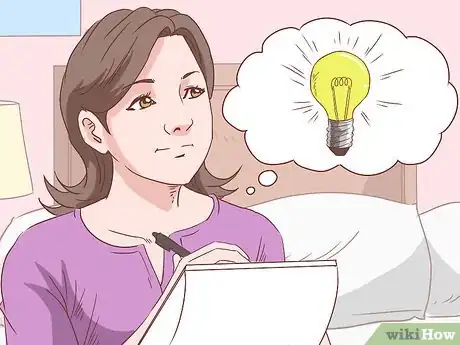
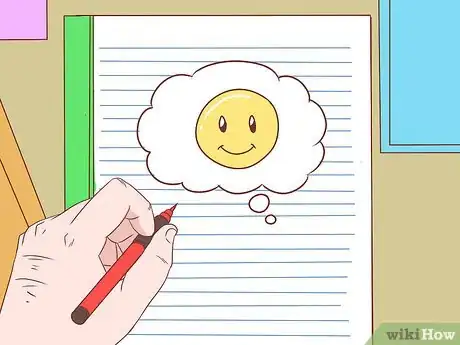
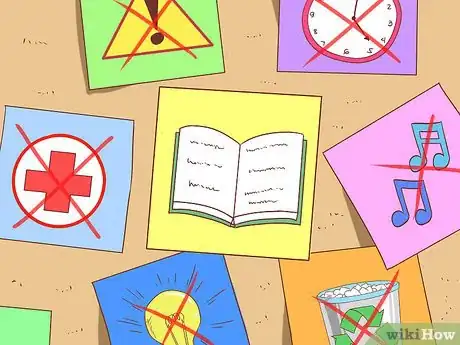
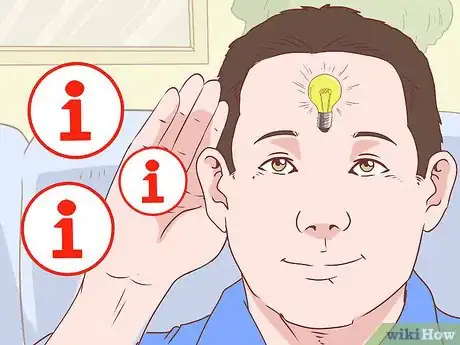




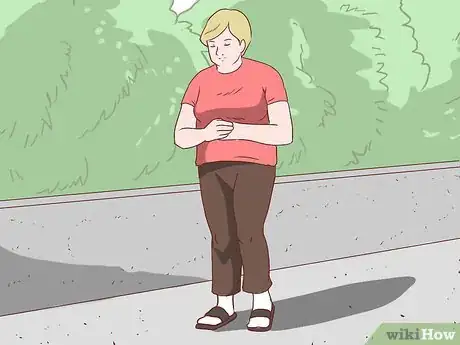





























-Step-18-Version-2.webp)




















































